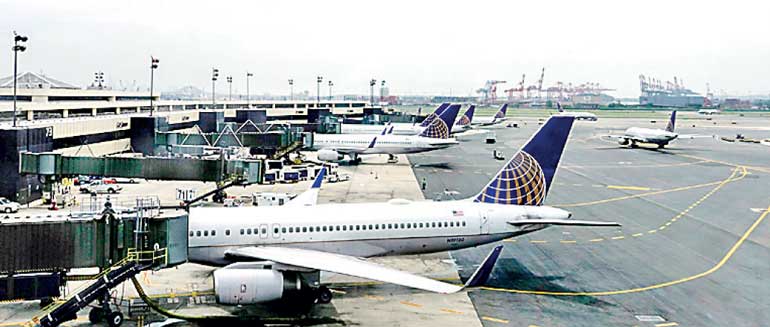Sunday Feb 22, 2026
Sunday Feb 22, 2026
Monday, 13 July 2015 00:00 - - {{hitsCtrl.values.hits}}
 United Airlines planes are seen on platform at the Newark Liberty International Airport in New Jersey, 8 July. United Airlines resumed flights at all US airports on Wednesday after they were grounded due to computer issues, according to the Federal Aviation Administration. The FAA issued the order to prevent all United Airlines flights from taking off following a system wide computer glitch, which was resolved, the agency said – REUTERS
United Airlines planes are seen on platform at the Newark Liberty International Airport in New Jersey, 8 July. United Airlines resumed flights at all US airports on Wednesday after they were grounded due to computer issues, according to the Federal Aviation Administration. The FAA issued the order to prevent all United Airlines flights from taking off following a system wide computer glitch, which was resolved, the agency said – REUTERS
Reuters: A computer router error that grounded hundreds of United Airlines flights last week is just a preview of what can go wrong for carriers with increasingly automated operations, experts say.
As airlines switch to electronic luggage tags and more travellers swap paper tickets for boarding passes stored on smartphones, industry consultants say the impact of technology disruptions will keep growing.
That means more money lost for airlines and more travel plans thwarted for passengers when a glitch occurs.
“Airlines are flying computers,” said industry analyst Henry Harteveldt. “Increased reliance on technology has enabled (airlines) to become a much more successful and efficient business, and that also creates an exposure.”
Wednesday’s disruption at United, which locked the airline out of its reservations records and therefore blocked check-in and boarding, led to delays for tens of thousands of travellers.
While a reservations failure of this kind could have happened more than a decade ago, recent automation and staff cuts have widened the impact. United had to halt flights on Wednesday in part because there were fewer airport staff on hand to help customers when automated check-in kiosks fell off the grid.
This was the second technical problem in about one month to ground United’s fleet. On 2 June, software needed to dispatch the airline’s flight plan briefly lost functionality.
American Airlines Group Inc flights were delayed just a month earlier because of an application problem on pilots’ iPads, which recently replaced paper flight manuals. Some planes returned to airport gates to access Wi-Fi and fix the issue.
Airlines have backup systems, but the recent disruptions have left experts asking whether they have invested enough in technological infrastructure, given new profits from baggage and cancellation fees.
“They should have had much more built-in resiliency and redundancy in the system,” Trend Micro Inc Chief Cyber security Officer Tom Kellermann said.
To be sure, technology has brought benefits like shorter wait times for check-in and more in-flight entertainment via Wi-Fi.
“Airlines’ investment in technology is only going to continue to improve the customer experience,” trade group Airlines for America said. “When there is a rare disruption, it is often those investments that enable airlines to quickly restore service.”
Consultant and former American Airlines executive Scott Nason said the number of outages had not increased with automation.
“The difference,” he said, “is that when they occur, they can more easily affect the airlines’ ability to actually fly.”